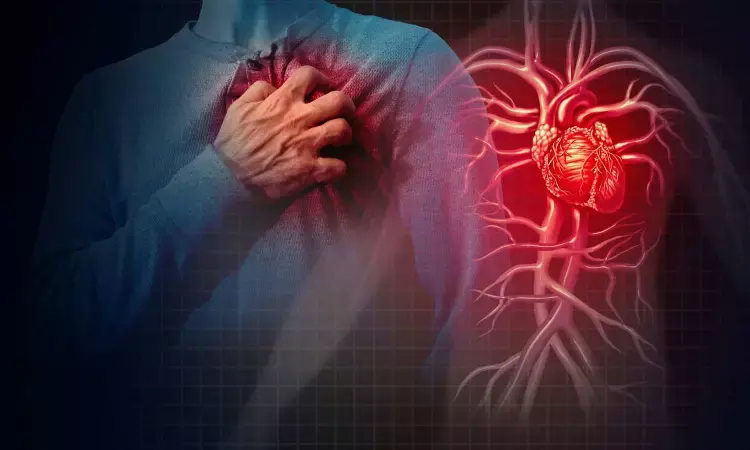- Home
- Medical news & Guidelines
- Anesthesiology
- Cardiology and CTVS
- Critical Care
- Dentistry
- Dermatology
- Diabetes and Endocrinology
- ENT
- Gastroenterology
- Medicine
- Nephrology
- Neurology
- Obstretics-Gynaecology
- Oncology
- Ophthalmology
- Orthopaedics
- Pediatrics-Neonatology
- Psychiatry
- Pulmonology
- Radiology
- Surgery
- Urology
- Laboratory Medicine
- Diet
- Nursing
- Paramedical
- Physiotherapy
- Health news
- Fact Check
- Bone Health Fact Check
- Brain Health Fact Check
- Cancer Related Fact Check
- Child Care Fact Check
- Dental and oral health fact check
- Diabetes and metabolic health fact check
- Diet and Nutrition Fact Check
- Eye and ENT Care Fact Check
- Fitness fact check
- Gut health fact check
- Heart health fact check
- Kidney health fact check
- Medical education fact check
- Men's health fact check
- Respiratory fact check
- Skin and hair care fact check
- Vaccine and Immunization fact check
- Women's health fact check
- AYUSH
- State News
- Andaman and Nicobar Islands
- Andhra Pradesh
- Arunachal Pradesh
- Assam
- Bihar
- Chandigarh
- Chattisgarh
- Dadra and Nagar Haveli
- Daman and Diu
- Delhi
- Goa
- Gujarat
- Haryana
- Himachal Pradesh
- Jammu & Kashmir
- Jharkhand
- Karnataka
- Kerala
- Ladakh
- Lakshadweep
- Madhya Pradesh
- Maharashtra
- Manipur
- Meghalaya
- Mizoram
- Nagaland
- Odisha
- Puducherry
- Punjab
- Rajasthan
- Sikkim
- Tamil Nadu
- Telangana
- Tripura
- Uttar Pradesh
- Uttrakhand
- West Bengal
- Medical Education
- Industry
Artificial intelligence can predict, prevent sudden cardiac death: Study

USA: Findings from preliminary research have shown the potential of artificial intelligence (AI) to predict sudden cardiac death, and even address a person's risk of preventing future death. The AI analysis was able to identify people who had more than 90% of the risk of dying suddenly, and they represented more than one-fourth of all cases of sudden cardiac death.
The findings, presented at the American Heart Association’s Resuscitation Science Symposium 2023 held from Nov. 11-12, in Philadelphia, could offer a new move toward prevention and global health strategies.
“Sudden cardiac death, a public health burden, represents 10% to 20% of overall deaths. Predicting it is difficult, and the usual approaches fail to identify high-risk people, particularly at an individual level,” said Xavier Jouven, M.D., Ph.D., the lead author of the study and professor of cardiology and epidemiology at the Paris Cardiovascular Research Center, Inserm U970-University of Paris. “We proposed a new approach not restricted to the usual cardiovascular risk factors but encompassing all medical information available in electronic health records.”
The research team analyzed medical information with AI from registries and databases in Paris, France and Seattle for 25,000 people who had died from sudden cardiac arrest and 70,000 people from the general population, with data from the two groups matched by age, sex and residential area. The data, which represented more than 1 million hospital diagnoses and 10 million medication prescriptions, was gathered from medical records up to ten years prior to each death. Using AI to analyze the data, researchers built nearly 25,000 equations with personalized health factors used to identify those people who were at very high risk of sudden cardiac death. Additionally, they developed a customized risk profile for each of the individuals in the study.
The personalized risk equations included a person’s medical details, such as treatment for high blood pressure and history of heart disease, as well as mental and behavioural disorders including alcohol abuse. The analysis identified those factors most likely to decrease or increase the risk of sudden cardiac death at a particular percentage and time frame, for example, 89% risk of sudden cardiac death within three months.
“We have been working for almost 30 years in the field of sudden cardiac death prediction, however, we did not expect to reach such a high level of accuracy. We also discovered that the personalized risk factors are very different between the participants and are often issued from different medical fields (a mix of neurological, psychiatric, metabolic and cardiovascular data) – a picture difficult to catch for the medical eyes and brain of a specialist in one given field” said Jouven, who is also founder of the Paris Sudden Death Expertise Center. “While doctors have efficient treatments such as correction of risk factors, specific medications and implantable defibrillators, the use of AI is necessary to detect in a given subject a succession of medical information registered over the years that will form a trajectory associated with an increased risk of sudden cardiac death. We hope that with a personalized list of risk factors, patients will be able to work with their clinicians to reduce those risk factors and ultimately decrease the potential for sudden cardiac death.”
Among the study’s limitations are the potential use of the prediction models beyond this research. In addition, the medical data collected in electronic health records sometimes include proxies instead of raw data, and the data collected may be different among countries, requiring an adaptation of the prediction models.
Reference:
Artificial intelligence may help predict – possibly prevent-sudden cardiac death, American Heart Association, Meeting: AHA Resuscitation Science Symposium 2023.
Dr Kamal Kant Kohli-MBBS, DTCD- a chest specialist with more than 30 years of practice and a flair for writing clinical articles, Dr Kamal Kant Kohli joined Medical Dialogues as a Chief Editor of Medical News. Besides writing articles, as an editor, he proofreads and verifies all the medical content published on Medical Dialogues including those coming from journals, studies,medical conferences,guidelines etc. Email: drkohli@medicaldialogues.in. Contact no. 011-43720751


